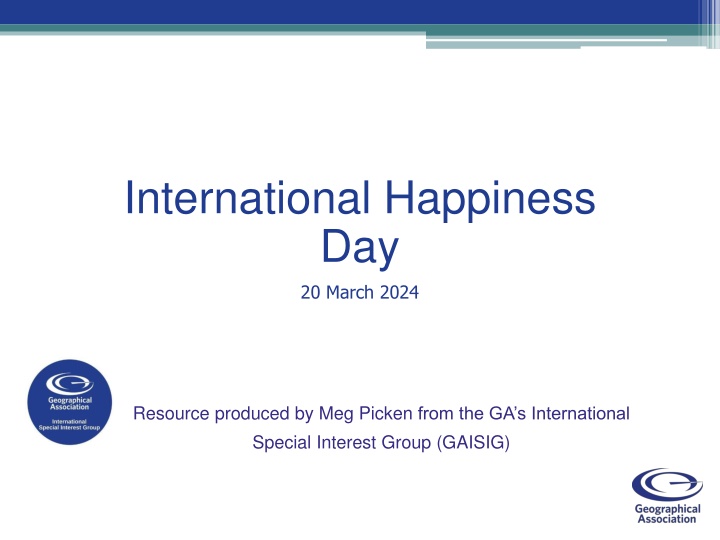International Happiness Day 2024 Resources & Diamond 9 Grid Insight
Discover insights on International Happiness Day 2024, rate life satisfaction, analyze factors affecting happiness, study global happiness mapping, and an engaging school idea project to promote happiness in student life.
Download Presentation

Please find below an Image/Link to download the presentation.
The content on the website is provided AS IS for your information and personal use only. It may not be sold, licensed, or shared on other websites without obtaining consent from the author.If you encounter any issues during the download, it is possible that the publisher has removed the file from their server.
You are allowed to download the files provided on this website for personal or commercial use, subject to the condition that they are used lawfully. All files are the property of their respective owners.
The content on the website is provided AS IS for your information and personal use only. It may not be sold, licensed, or shared on other websites without obtaining consent from the author.
E N D
Presentation Transcript
International Happiness Day 20 March 2024 Resource produced by Meg Picken from the GA s International Special Interest Group (GAISIG)
Overall, how satisfied are you with your life these days? Rate your life satisfaction on a scale of 0-10 0 = completely dissatisfied 10 = completely satisfied
Complete a Diamond 9 grid, ranking which factors you think are most important for a person s happiness. Physical health Mental health Relationships Income and employment Social support Personal freedom Lack of corruption Effective government Access to resources
Study the map (a larger version is on the next slide) and answer the questions below. 1. Which continent has the happiest countries? 2. Which continent has the unhappiest countries? 3. Which country has the highest reported levels of happiness? 4. Which country has the lowest reported levels of happiness? 5. Can you find an anomaly in the data set? e.g. Is there a much happier country amongst a group of unhappier countries? 6. Why might data be inconclusive from a country? What might this tell us about that country? 7. This data is self-reported. Why do we therefore have to be somewhat careful when using this map? 8. Speculate why some countries may have happier citizens than others. Source: https://www.visualcapitalist.com/worlds-happiest-countries-2023/
Source: https://www.visualcapitali st.com/worlds-happiest- countries-2023/
Answers 1. Europe, Oceania and North America 2. Africa, south-east Asia 3. Finland = 7.8 4. Afghanistan = 1.9 5. Afghanistan is much lower than other countries in Asia. Israel and Saudi Arabia are much happier than other countries in the Middle East region 6. Data may be inconclusive due to having too few people living there to form a reliable dataset. Political interventions or lack of response to survey may mean citizens have not been able to give responses. 7. With these scores being subjective, it is dependent upon a person s understanding of happiness and there may not be a universal understanding of this. 8. Source: https://www.visualcapitalist.com/worlds-happiest-countries-2023/
PRIMARY SCHOOL IDEA Imagine you have been given an unlimited budget to create a new school, but its goal is to be a happy school. Draw a picture of Happy School and annotate the features which will make this happier than a standard school today. How can we make pupils in schools happier?
SECONDARY SCHOOL IDEA Consider the factors below. Choose three and explain how this would affect perceived happiness in a country. All of these statements apply to rich countries from a UN report. In 12 of 41 countries, less than 75% of children aged 15 have high life satisfaction. Two in five children (on average) do not acquire basic reading and mathematics skills by age 15. In some countries, at least 1 in 10 parents report no family or friends they can count on for help with looking after their children. Many children report not having any access to books at home. An increasingly high number of children report they spend time with their friends on gaming devices, rather than playing outside. In five rich countries, parental leave is less than In 10 countries, more than one in three children is overweight or obese. The number of obese children (aged 5-19) worldwide is expected to grow from 158 million to 250 million by 2030.
PLENARY Watch this video clip - https://era.org.uk/streaming-service-resource/africa-jumping-for-joy- bbc-one/ What makes you as happy as this Springbok? Does nature make you happy? Are there any changes you could make to your life to be happier?























